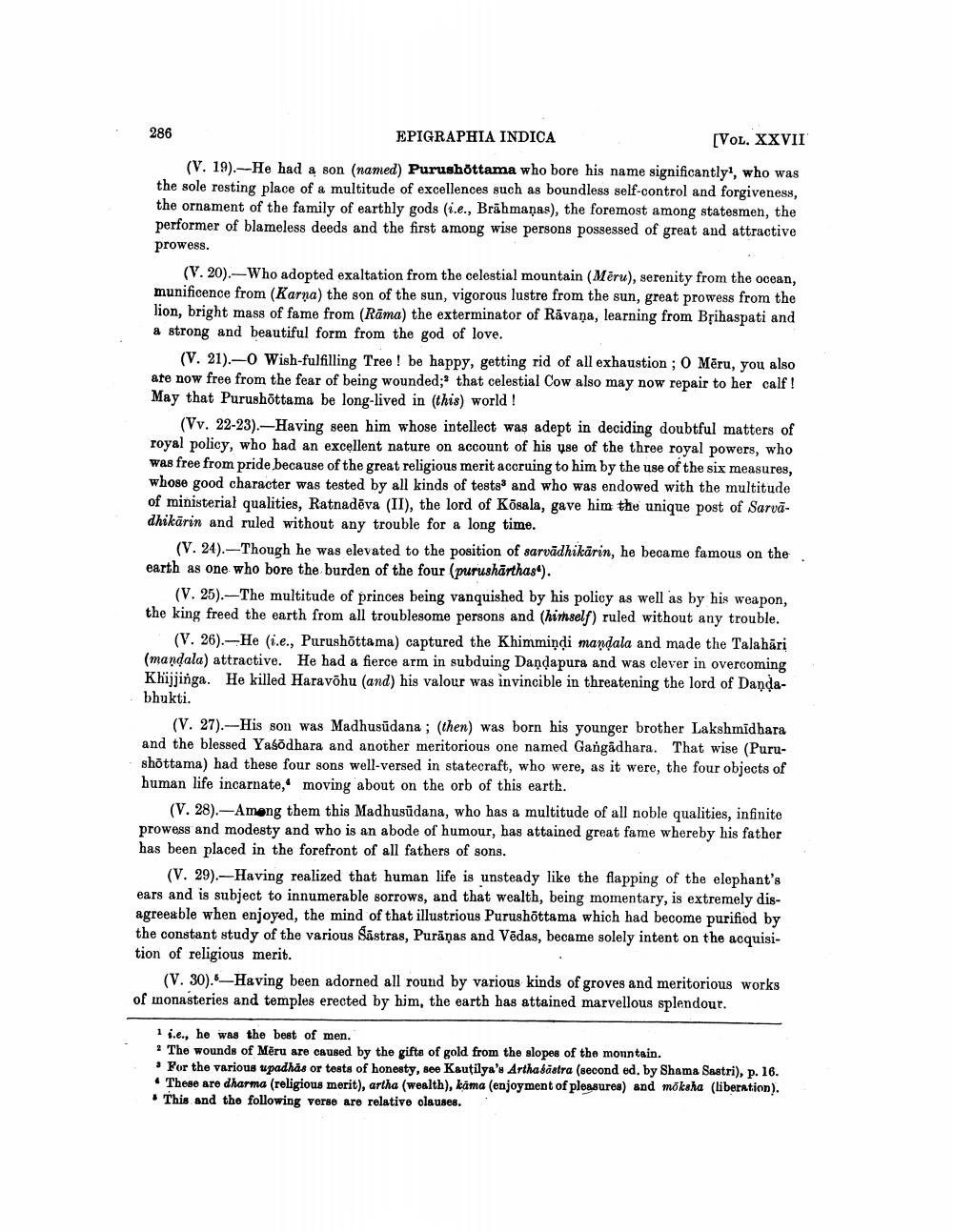________________
286
EPIGRAPHIA INDICA
[Vol. XXVII
(V. 19).--He had a son (named) Purushottama who bore his name significantly, who was the sole resting place of a multitude of excellences such as boundless self-control and forgiveness, the ornament of the family of earthly gods (i.e., Brāhmaṇas), the foremost among statesmen, the performer of blameless deeds and the first among wise persons possessed of great and attractive prowess.
(V. 20).-Who adopted exaltation from the celestial mountain (Mēru), serenity from the ocean, munificence from (Karna) the son of the sun, vigorous lustre from the sun, great prowess from the lion, bright mass of fame from (Rāma) the exterminator of Rāvaņa, learning from Bțihaspati and a strong and beautiful form from the god of love.
(V. 21).- Wish-fulfilling Tree! be happy, getting rid of all exhaustion ; 0 Mēru, you also ate now free from the fear of being wounded;" that celestial Cow also may now repair to her calf ! May that Purushottama be long-lived in (this) world!
(Vv. 22-23).-Having seen him whose intellect was adept in deciding doubtful matters of royal policy, who had an excellent nature on account of his use of the three royal powers, who was free from pride because of the great religious merit accruing to him by the use of the six measures, whose good character was tested by all kinds of tests: and who was endowed with the multitude of ministerial qualities, Ratnadēva (II), the lord of Kösala, gave him the unique post of Sarvadhikärin and ruled without any trouble for a long time.
(V. 24).-Though he was elevated to the position of sarvādhikärin, he became famous on the earth as one who bore the burden of the four (purushārthasa).
(V. 25).- The multitude of princes being vanquished by his policy as well as by his weapon, the king freed the earth from all troublesome persons and (himself) ruled without any trouble.
(V. 26).-He (i.e., Purushottama) captured the Khimmiņdi mandala and made the Talahāri (mandala) attractive. He had a fierce arm in subduing Dandapura and was clever in overcoming Khijjinga. He killed Haravõhu (and) his valour was invincible in threatening the lord of Dandabhukti.
(V. 27).-His son was Madhusudana ; (then) was born his younger brother Lakshmidhara and the blessed Yasõdhara and another meritorious one named Gangadhara. That wise (Purushottama) had these four sons well-versed in statecraft, who were, as it were, the four objects of human life incarnate, moving about on the orb of this earth.
(V. 28).- Ameng them this Madhusūdana, who has a multitude of all noble qualities, infinite prowess and modesty and who is an abode of humour, has attained great fame whereby his father has been placed in the forefront of all fathers of sons.
(V. 29).--Having realized that human life is unsteady like the flapping of the elephant's ears and is subject to innumerable sorrows, and that wealth, being momentary, is extremely disagreeable when enjoyed, the mind of that illustrious Purushottama which had become purified by the constant study of the various Šāstras, Purāṇas and Vēdas, became solely intent on the acquisition of religious merit.
(V. 30). Having been adorned all round by various kinds of groves and meritorious works of monasteries and temples erected by him, the earth has attained marvellous splendour.
11.e., he was the best of men. 2 The wounds of Mēru are caused by the gifts of gold from the slopes of the monntain. • For the various upadhaa or tests of honesty, see Kautilya's Artha bästra (second ed. by Shama Sastri), p. 16. . These are dharma (religious merit), artha (wealth), kama (enjoyment of pleasures) and mõksha (liberation), . This and the following verse are relative olauses.




